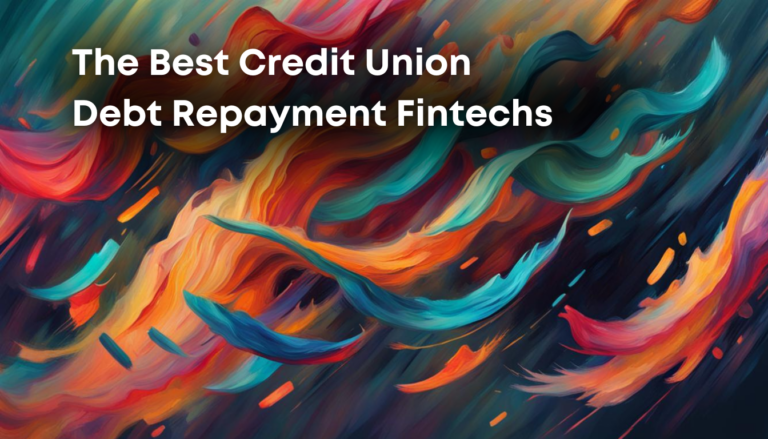With climbing delinquencies and falling savings, credit risk has been an ongoing concern for credit unions. As far as the NCUA is concerned, it’s right up there with liquidity risk.
But the solution can’t just be to lend less. That’s no good for anyone. Instead, credit unions should help people manage and repay outstanding debt.
So, we looked into fintechs that partner with credit unions to help members pay off debt. In theory, this should help credit unions manage credit risk while also helping vulnerable members descend into a dreaded debt spiral.
Read on to see options, plus our favorite!
A Quick Note about Our Priorities
While reviewing fintechs that help members pay down debt, we looked at a few key variables:
- Effectiveness of debt repayment
- Ability to manage credit risk
- Overall impact on the credit union’s…
- Income statement
- Balance sheet
- Membership
- Employees
Unlike our guides, we didn’t explicitly quantify these factors here. However, we’ve kept them in mind and made notes where we thought it was appropriate.
Credit Union Debt Repayment Partners (to Mitigate Credit Risk)
Unfortunately, no fintechs have developed a solution to combat high inflation and rising interest rates. However, many have come up with fantastic ways to help consumers manage debt and pay off loans.
These are five of our favorites that also partner readily with credit unions:
1. Changed
You may remember Changed from our review of deposit-generating fintechs. Changed started as an app to help people pay off student loans, and these days, they’ve expanded to help people pay off all sorts of debt, including:
- Credit cards
- Auto loans
- Personal loans
- Mortgages
With Changed, members “round up” the spare change from their purchases and put it towards debt repayment.
What we like: It’s easy to use, flexible on what kind of debt can be repaid, and debt-free users can use it to build savings (thus generating deposits).
Where it falls short: It’s not likely to add members, and its relatively limited use case may leave some debt repayment and credit risk needs unmet. Plus, it requires frequent purchases to make a difference—and people with high debt may not spend all that often.
2. EarnUp
EarnUp is a fintech that turns people with debt into members with payment plans. Like Changed, they specialize in helping borrowers pay off their student loans. Yet, their repayment options and support are wide-reaching.
If you’ll follow us on this one: EarnUp is debt repayment, but not just debt repayment.
They provide a dashboard where members can see all their debt on a single dashboard. From there, they can manage payments, optimize cash flow, and accelerate debt payoff.
Aside from helping members pay off debt, EarnUp helps with:
- Memberizing people with debt
- Boosting member recapture
- Lowering delinquency and default rates
- Identifying cross-sell opportunities
Furthermore, their debt dashboard improves “stickiness” and member loyalty.
What we like: The memberization engine is great, the dashboard is very slick, and it encourages members to boost savings and CU product adoption as well. EarnUp also gives CU staff insights on actions to take with each member.
Where it falls short: EarnUp’s cross-sell opportunities and support for cross-sells and “next best product” offers are primarily delivered as insights (to both the member and the CU) rather than as native, in-dashboard options.
3. Guac
Guac is another standout from our review of deposit-generating fintechs. Guac users “tip themselves” a percentage of purchases, which goes toward any number of flexible financial goals (including debt repayment).
Guac’s strength comes from the sheer potential it has for paying down debt and generating deposits. On average, they help credit unions generate $300 per user per month in deposits.
What we like: Guac demonstrates a high potential for debt repayment and deposit generation
Where it falls short: People without high monthly spend—such as those with heavy debt—won’t “tip themselves” much on purchases, making it potentially less effective as a pure debt repayment and credit risk solution.
4. Happy Money
Happy Money joined the CU 2.0 Podcast to discuss their solution to consumer debt:
Essentially, they offer a “payoff loan,” which is a consolidation loan that helps people pay off high-interest debt (such as credit cards). Happy Money’s sweet spot is the $5–40k range.
What sets Happy Money apart from others on this list is that they make a real play at targeting non-members. The goal isn’t just debt repayment, but memberization.
However, that raises the question: does memberizing highly indebted people address credit risk?
What we like: Happy Money is mission-driven, and their solution reflects that. Also, it’s a good memberization engine.
Where it falls short: We’re not convinced that Happy Money adequately addresses credit risk, and they typically help only with credit card debt, which makes them a very niche product.
5. Nickels
Nickels leans on behavioral science to help members manage their money and pay down debt. They track member card use and spending data to provide individualized guidance on where to adjust their spending habits and manage debt.
Nickels’ primary aims are to:
- Shift spend from other FI cards to the credit union’s card
- Refinance member card debt through the credit union
- Encourage high-volume transactors to grow deposits with the credit union
Ultimately, Nickels is geared toward converting members to credit union products. Their debt management (and deposit generation) solutions are secondary benefits.
What we like: Nickels is a cross-sell play designed to promote credit union products and keep the credit union top of wallet.
Where it falls short: Compared to the other fintechs on this list, Nickels offers fewer options for debt repayment and credit risk.
Getting Started with a Debt Repayment and Credit Risk Fintech
All the fintechs above have strong solutions. We believe that all of them will address some or most of a credit union’s needs regarding debt repayment options for members. We also believe that most of them will have an impact on credit risk, though that’s a little more difficult to quantify and will depend more on the credit union’s loan portfolio.
Currently, our favorite option on the list above is EarnUp. EarnUp’s offers a pure debt management solution that:
- Doesn’t rely on consumer spending (people in debt often spend less than people without debt), and
- Doesn’t rely on refinancing debt through the credit union, potentially exposing the CU to more credit risk.
One of the things that draws us to EarnUp is that it gives the CU insight into other products serviced by other lenders for cross sell opportunities (such as consolidation loans).
With the potential to cross sell and improve member loyalty, EarnUp stays relevant even after the debt is paid. Memberization is just the cherry on top.
Learn more about EarnUp here:




